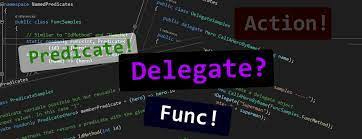C# : Action and Func delegates

In the dynamic world of C# programming, delegates play a pivotal role in enabling developers to write flexible and extensible code. Among these, the Action and Func delegates stand out, offering a concise and expressive way to handle method references.
This article explores the capabilities and use cases of Action and Func delegates, shedding light on their nuances and practical applications.
Understanding Delegates in C#
Before delving into Action and Func delegates, it’s crucial to comprehend the concept of delegates in C#.
A delegate is essentially a type-safe function pointer that can reference methods, allowing developers to pass methods as parameters or store them as variables.
Delegates facilitate the implementation of call-backs, event handling, and other scenarios where functions need to be passed around like objects.
Action Delegate: A Simpler Way to Perform Actions
The Action delegate, introduced in .NET Framework 3.5, simplifies the syntax for delegates that perform an action but do not return a value.
It is a generic delegate with up to 16 parameters, making it a versatile tool for handling various scenarios. The beauty of the Action delegate lies in its simplicity and ease of use.
In this example, the Action delegate takes two parameters (an integer and a string) and performs a simple action, printing the received values to the console.
This simplicity makes Action delegates an excellent choice for scenarios where the emphasis is on performing an action rather than returning a result.
Func Delegate: Bridging the Gap Between Actions and Functions
While the Action delegate is tailored for methods that don’t return a value, the Func delegate is designed for methods that do.
Like the Action delegate, Func is a generic delegate, but it includes a return type as its last type parameter.
Func<int, int, int> addFunction = (a, b) => a + b;
// Invoking the Func delegate
int result = addFunction(3, 5);
Console.WriteLine($"Result of addition: {result}");Here, the Func delegate takes two integers as parameters and returns their sum. The return type is specified as the last type parameter (int in this case).
Func delegates are particularly handy when dealing with methods that produce a result, providing a unified approach to working with both actions and functions.
Practical Applications
Event Handling
Both Action and Func delegates find extensive use in event handling scenarios.
Action can be employed for events that trigger actions without returning a result, while Func can handle events where a result is expected.
Call-back Mechanisms:
Delegates shine in scenarios where call-back mechanisms are essential.
Action delegates are perfect for call-backs that involve performing an action, while Func delegates handle call-backs where a result is crucial.
Parallel Programming:
The simplicity of Action delegates makes them well-suited for parallel programming scenarios, where tasks need to be performed concurrently without the overhead of managing return values.
Conclusion
In the vibrant landscape of C# programming, Action and Func delegates stand as powerful tools, offering simplicity and flexibility.
The Action delegate excels in scenarios where actions need to be performed, while the Func delegate seamlessly integrates with methods returning values.
By understanding and harnessing the capabilities of these delegates, developers can write cleaner, more modular, and extensible code, ultimately enhancing the overall quality of their C# applications.
Happy coding!

